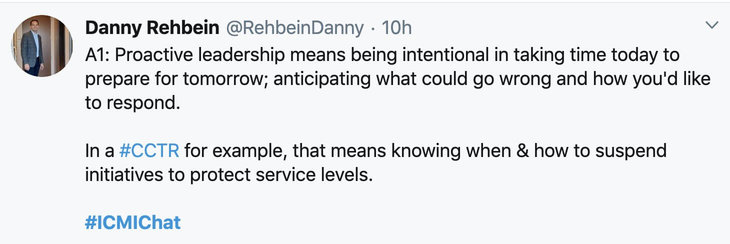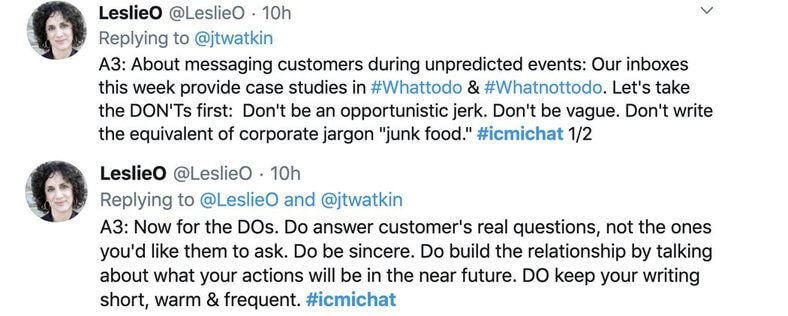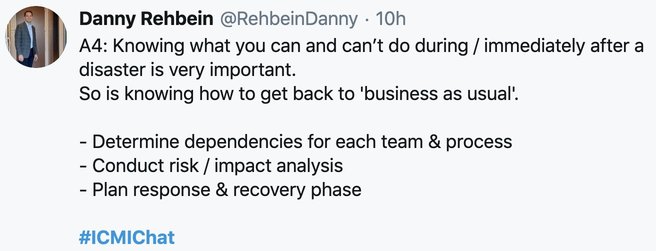By
Jeremy Watkin
|
Date Published: March 20, 2020 - Last Updated September 08, 2020
|
Comments

As frontline contact center agents, there’s something comforting about the daily rhythm of waiting for customers to contact us and responding when they do. The work comes to us and we simply react. When we move into leadership roles, however, continuing to default to this reactive position can be dangerous.
In my own journey in contact center leadership, I believed that any time our call queue was full, it was my responsibility as a leader to roll up my sleeves and help my team “clear the queue.” I was completely frazzled and burned out as a result.
During one pivotal conversation with a manager during a particularly busy season, I learned that my actions weren’t helping in the long term because of my failure to take proactive steps to address the root cause of problems with the queue buildup. I began spending more of my time working to understand and prevent unplanned spikes in volume.
- Some of the actions I took included:
- Working to better understand and manage to metrics
- Improving workforce management to right size and correctly schedule agents
- Addressing the root causes of spikes in call volume and working with other groups in the organization to fix those issues
- Moving my contact center to the cloud for added flexibility, allowing me to make updates on the fly and allowing agents to work anywhere they had reliable internet
It’s with this in mind that I led a discussion on proactive leadership in a recent #ICMIChat on Twitter. From that chat, we collectively devised eight characteristics of proactive contact center leaders:
1. Proactive leaders take time today to prepare for tomorrow
First, we discussed what it means to be a proactive contact center leader. It’s no surprise that the responses revolved around the importance of planning ahead. Danny Rehbein, Customer Experience Coach, said it best:

So often planning means anticipating customer interaction volume to ensure proper staffing. But as Al Hopper, customer experience and contact center expert, points out, proactive leaders focus on continuous improvement and innovation.

And finally, proactive leaders are expert change-managers and possess the ability to communicate effectively with all stakeholders. This tweet from Piyush Govil, HR Leader, is spot on:

2. Proactive leaders learn from the past
While it’s possible to proactively plan for many situations, there’s always going to be a level of unpredictability in the contact center. This is why it’s so important to learn from those unpredictable occurrences. I’ve found value in a good postmortem discussion to explore ways to improve for next time. Al Hopper draws from his Army experience, referring to these as After Action Reviews.

A good postmortem is focused on bringing together all groups in the organization that can help improve for next time. For example, if there’s some sort of an outage, it might make sense to include IT to understand what happened with the technology, and include marketing to ensure that customer communication is on brand. Troy White, IT Manager and consultant, cautions that assigning blame is not the purpose of a postmortem discussion.

3. Proactive leaders communicate effectively during unpredictable situations
As much as we’d like to be prepared for everything, there will always be occurrences completely out of our control. Think glitches, bugs, outages, inclement weather, last minute sick time, and any other situation that prevents customers from receiving the service they expect. Also consider events that prevent agents from connecting with customers or from making it to work altogether. One of the most critical traits of a proactive leader is their ability to communicate both internally and externally. Troy White says it well:

What should that communication look like? Dave Dyson, Sr Customer Service Evangelist at Zendesk shared the following recipe:

You may also want to take a look at Dyson’s comprehensive guide for managing customer satisfaction in a crisis.
Finally, as you think about communication, customer service writing expert and owner of E-WRITE Leslie O’Flahavan shares some guidelines around what leaders should and should not say.

4. Proactive leaders plan for business continuity
During unexpected events, contact centers need to remain operational for customers to continue to communicate with your company. Danny Rehbein has some things to consider:

In addition to knowing how to act, the business continuity plan helps contact center agents know what they can and can’t say, and encourages everyone to set clear and consistent expectations with customers. Also, when it comes to business continuity, your contact center technology should enable agents to work from anywhere should they ever be unable to make it to the office.
5. Proactive leaders properly staff their contact center
Staffing a contact center to meet customer demand requires a combination of a variety of factors. This includes looking at historical data and projected customer growth to predict the needed staff for a given time period.
Dave Dyson advises using work from home and agent cross-training for added flexibility in your staffing model to better adapt to unpredictable demands that arise.

6. Proactive leaders pay attention to the right metrics
When it comes to metrics, proactive leaders create reports and dashboards to monitor the performance of the contact center. Having the right reporting in place ensures that you can monitor performance in the event that your contact center moves from brick and mortar to work from home.
But what metrics should you track? To ensure that the contact center meets desired service levels and is ready for unexpected spikes in volume, pay attention to these:

Also be sure to define what productivity means for your agents. That way you can ensure that productivity is consistent regardless of where agents are working from.
7. Proactive leaders trust their agents even when they don’t see them
During the chat I asked attendees to weigh in on the most important considerations when sending them to work at home. Certainly it’s important to have the right tools and technology and work-from-home policies in place. After all, quality and productivity must remain consistent regardless of where agents work.
The biggest trait the group highlighted was the importance of trusting that the agents they hired will continue to do good work, even when working from home. These words from Richard Kenny, Senior Product Marketing Manager at Poly, are especially poignant.

8. Proactive leaders care for their agents
There are a couple critical considerations when it comes to caring for contact center agents. First, proactive leaders express encouragement and appreciation early and often for their teams. Troy White says it well:

Second, they recognize that contact center agents are most successful when they have the ability to effectively collaborate with one another to solve customer problems. In cases where they work from home, video and team messaging also allow for social connection which increases engagement. Richard Kenny says it well.

Join #ICMIChat every Tuesday at 1PM Eastern/10AM Pacific. I promise that regardless of the topic, you will gain tools and best practice to become a more proactive contact center leader.
ICMIchat – March 24 – Topic: “When the Plans Don’t Fit the Situation”
These are extraordinary times, and we appreciate your hard work to keep the wheels of business turning.
Q1. Are and your teams OK? Safe and healthy?
Q2. Did/does your contact center have a workable business continuity plan?
Q3. Are you currently running under your business continuity plan? How’s it going?
Q4. What have you needed that you did/do not have?
Q5. What have you *not* needed that you thought you would?
Q6. Are you documenting everything for inclusion in your next business continuity plan update?
Q7. How well have you been able to adapt to the rapidly changing needs of your organization and your customers during this time?
Q8. Given the opportunity (and let’s hope we aren’t) what would you have done differently or sooner regarding the current pandemic?